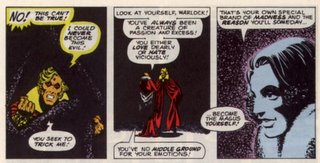ABSOLUTION
1.
Guilt is always closely followed by disgust: disgust at oneself, of course, but also at the other person for being your victim. And if they have not discovered the heinous crime you have committed against them, well then they are all the more pitiful for remaining in ignorance.
Disgust towards the object of your betrayal does not arise from the act, but from the thought of betrayal. If one seriously considers adultery and then backs out at the last minute, one will still be unable to look one's partner in the eye. From the point of view of guilt, therefore, it does not matter much whether you go through with the liaison or not: it is the thought that counts.
The Lacanian theory of guilt is complex, but it seems to revolve around the desire to get caught, the desire for punishment. This is both conscious and unconscious. A person who has considered adultery might call out the name of "the other woman" during sex with his partner. Another person might choose to go on an illicit date to a place where she subconsciously knows she will get caught. Either way, s/he will get found out and be subjected to the punishment which is the only thing that will absolve her/is guilt.
Sometimes - in fact, very often - guilt is present only at an unconscious level, and might be evident only through symptoms. So a man who desires a female friend might start reading authors favoured by her, or to take a more common example, might start dreaming about her. Whether it is conscious or unconscious, guilt is ubiquitous.
2.
If we are talking about conscious and unconscious guilt being correspondent, we must refine our ideas of moral agency. For while the adulterer and the person tempted by adultery might be culpable, surely the person who merely thinks lustful thoughts about his colleague in his sleep cannot be at fault?
This would appear to be our first lesson: guilt is not about apportioning blame. Sinthome comes up with an excellent Lacanian formulation for guilt here:
An examination of actual actions seems to do little good in alleviating the feelings of guilt, as these events and situations in the present are only occasions for satisfying one's guilt, they are not the cause of one's guilt.
What causes guilt, says Lacan, is “giving ground relative to one’s desire.” In other words, guilt is inextricably linked to desire : they are like sister drives, inseparable from one another. To make any sense of this, we must remember how desire works.
3.
Put simply, desire is what is left over when a demand is unfulfilled. If I want to be admired at work, but find my efforts disregarded and ignored by my boss and my colleagues, this will set off a desire : either for self-betterment, or to be more assertive, or to wreak revenge on my inattentive colleagues.
Likewise, if I demand sex from my partner (by this I mean if my body demands sexual fulfilment) and my partner does not wish to have sex, this will set off a series of possible desires. One of these might be to find sexual fulfilment elsewhere. If I “give ground to this desire,” guilt will surely follow.
So what are we to do?
We can try to forget about our desires, pretend they do not exist, carry on as normal. But, by definition, you cannot snuff out a desire. You can try out all sorts of tricks to “put it to the back of your mind,” but it will always return to haunt you. It may not return as an overt desire (wanting to fuck your colleague), but rather disguised as something else. We can see how this could be far more dangerous than the original, unrepressed desire.
4.
Better, Lacan says, not to “give ground to one’s desire.” It is important here not to confuse desire with need. If you want to fuck a particular person other than your partner, this is not a desire, but a need, or even a demand. Desire does not work on this conscious level. It is formulated through a network of inter-subjective influences, but actually it is simply a gap.
You may create an object which you think will fulfil your desire (the “other woman”), and you will choose an object on the basis of fantasies. You may work yourself into a frenzy chasing this person, trying to second-guess them, working out what you mean to them, how your fill their own gap of desire. You may think that in fulfilling your fantasies, you will fulfil your desire. But you are fooling yourself. There is no object to desire; it is ephemeral; it is nothingness made flesh.
In order not to give ground to our unconscious desires, Lacan says we must engage with them. We must jump into the abyss of our unconscious and become master of it, rather than the other way round.
5.
One would expect the superego to be at the heart of desire and guilt. It is usually seen as the part of the psyche which commands us not to follow our basest instincts, but to obey those laws and principles to which we, as decent members of society, are expected to adhere. It is, in other words, our browbeating moral compass.
Not so, says Lacan. The message of the superego is not “Do your duty!”, but “Enjoy your duty!” Zizek uses the example of a parent coercing his child to go and see his grandmother. The repressive parent will say, “I don’t care if you want to, just do it!” Whereas the superego figure will say, “You should only go and see grandma if you wish to; though you know how much she would like to see you.” As Zizek explains,
The trick performed by the superego is to seem to offer the child a free choice, when, as every child knows, he is not being given any choice at all. Worse than that, he is being given an order and told to smile at the same time. Not only: 'You must visit your grandma, whatever you feel,' but: 'You must visit your grandma, and you must be glad to do it!' The superego orders you to enjoy doing what you have to do. What happens, after all, if the child takes it that he has a genuinely free choice and says 'no'? The parent will make him feel terrible. 'How can you say that!' his mother will say: 'How can you be so cruel! What did your poor grandma do to make you not want to see her?'
There is something deeply totalitarian in this message. Think back to Nazism or Stalinism, or the image we have of North Korea today. The message which these regimes give to their people is: “This is your duty – if you do not enjoy carrying it out, you are guilty.”
6.
The postmodern superego thus increases the risk of our carrying out an immoral act, and increases the likelihood of our feeling guilty. We are awash with mixed messages: the Decalogue may tell us that adultery is forbidden, but our media tells us we should be fucking regularly, preferably with a selection of different people.
Similarly, the American soldier who has today been jailed for killing an Iraqi, claimed that “I knew that we were doing something wrong. I wanted to be part of the team. I wanted to be loyal.” All the time we hear two conflicting symbolic voices. One is the voice of traditional morality (something like the Kantian voice, or the Christian “do as you would be done by”). The other is the voice of liberal subjectivity (“you are a free human being – you decide what’s right”). Only, as Zizek explains above, there really is no choice.
Lacan’s solution – to take responsibility for our unconscious desire – is especially difficult, partly because desires struggle against each other, bend and shape each other. But also because the symptoms which expose our hidden desires – our dreams, our temptations, our feelings of paranoia and neurosis and guilt – are themselves repetitions of other events, long since repressed. The object of the exercise must be to reject the duties which the superego imposes, and to wrest from it control of one’s responsibilities. This all sounds rather weasel-worded - but Sinthome’s concluding questions might be a better place to start:
- What is this mysterious desire?
- How do we discover this mysterious desire?
- How is this mysterious desire to be distinguished from jouissance or enjoyment?
- If jouissance is the guilt-producing command of the superego in which I give way on my desire, what does it mean to avow my desire (if not to enjoy)?

2 Comments:
Always 'interesting' to see my own problems condensed into a short but succinct post about the Lacanian theory of guilt and desire. A little too impressively relevant. Still, how thin the line sometimes between unconscious and conscious desire! And then again, what would be the best way to confront the unconscious desires, or conscious ones? If they cannot be snuffed out, then how does one become master? I'm dreadfully out of my league when it comes to Lacan, I'm afraid.
I suppose the main difference between psychoanalysis and other forms of therapy is that p/a offers no easy fixes or formulae. This may sound like a facetious get-out clause for not answering your questions, but I don't think you ever can become the absolute master of your desires - to master them is not overcome and destroy them, but merely to be aware of them.
To become aware of them (particularly the unconscious ones), you need to know how and where to look. The psychoanalytic textbooks will tell you that dreams, slips of the tongue, symptomatic obsessions etc are the mouthpieces of the unconscious. The trouble is, if one tries to analyse the content of one's dream, one must be aware of the different layers of latency within the dream - usually the most obvious interpretation only tells part of the story. You need to put the dream into context etc etc.
I find that listening to your darkest, most socially unacceptable thoughts is a useful way of probing into the unconscious, and even the more cryptic parts of the conscious. One can often think quite barbaric thoughts quite consciously, and without embarrassment. You would never say them out loud, but you nevertheless know they are there, and you are not particularly ashamed of them.
The old Lacanian thing about the objet petit a - the immediate object of desire - merely being a canvas onto which you project your desire helps too. In other words, you may wish to sleep with the woman behind the desk at the local library (librarians of Islington please note: this is merely a hypothetical example), but this is not because of anything inherent in her. She is merely a by-product of your desire. In fact, you may enjoy great happiness together, but only if you both realise that you will not wholly fulfil each other's desires. If one does not recognise this, one can get drawn into a devouring web of deceit and betrayal, with nothing at the end to show for it.
Post a Comment
<< Home